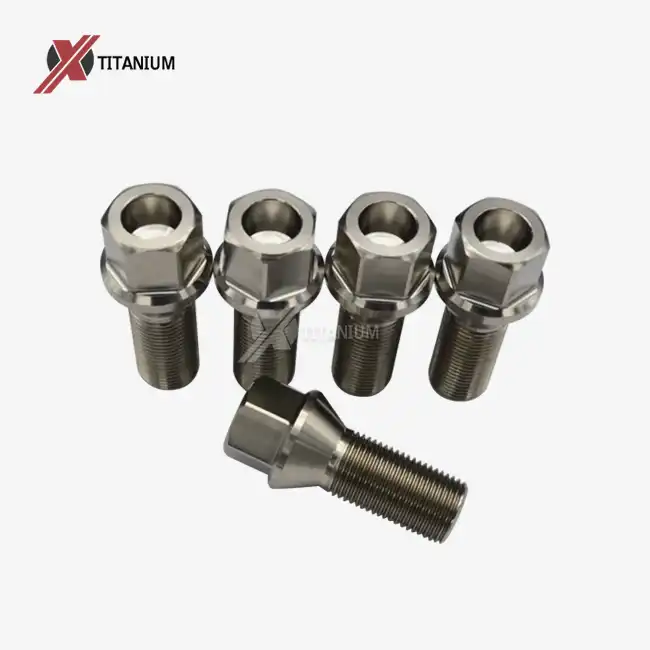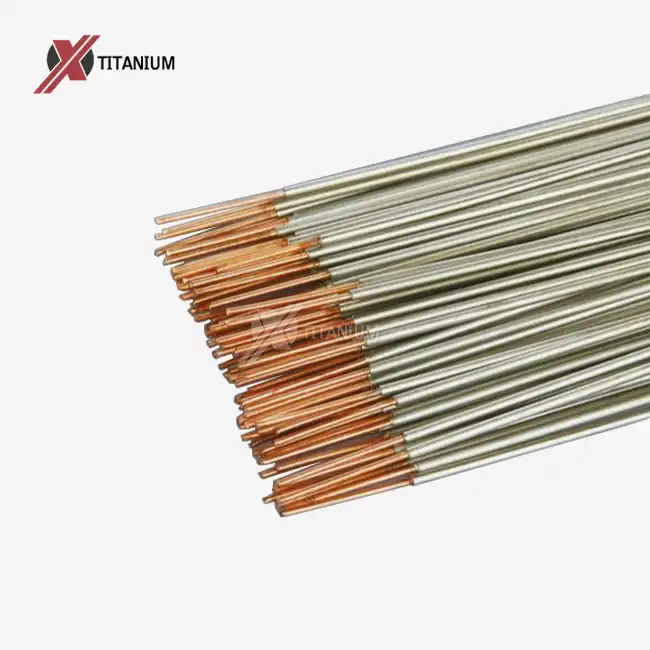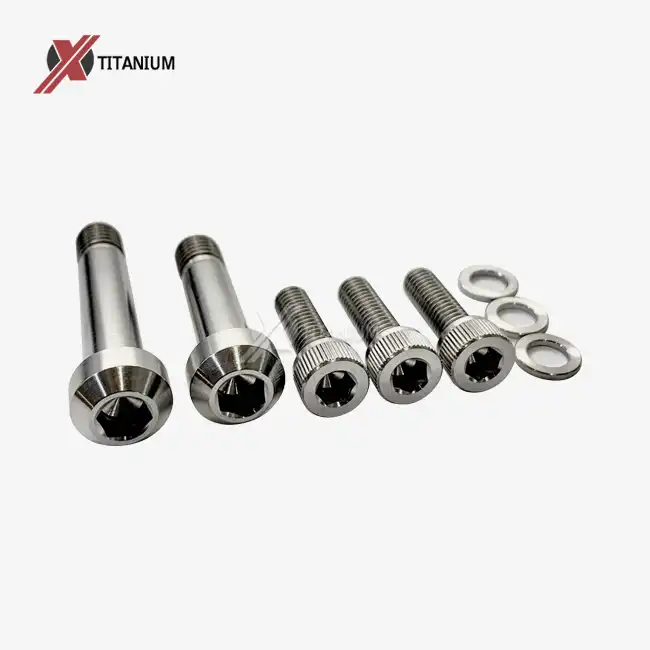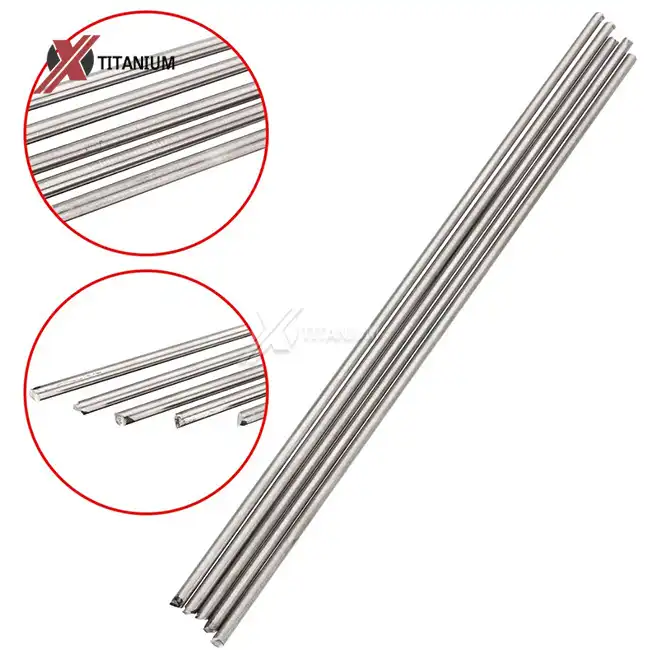The Advantages of Titanium Wheel Bolts in Automotive Applications
Unparalleled Strength-to-Weight Ratio
Titanium wheel bolts boast an exceptional strength-to-weight ratio, surpassing that of traditional steel or aluminum fasteners. This characteristic allows for robust wheel attachment while significantly reducing the overall weight of the wheel assembly. The reduction in unsprung mass is particularly crucial for performance vehicles, as it directly impacts the suspension's ability to maintain consistent contact with the road surface. By minimizing this weight, titanium wheel bolts contribute to improved handling, faster acceleration, and more responsive braking.
Corrosion Resistance and Longevity
One of the standout features of titanium wheel bolts is their remarkable resistance to corrosion. Unlike steel bolts that may rust over time, especially when exposed to road salt or harsh weather conditions, titanium bolts maintain their integrity for extended periods. This corrosion resistance not only enhances the aesthetic appeal of the wheels but also ensures that the bolts remain easy to remove during maintenance or tire changes. The longevity of titanium wheel bolts translates to reduced replacement frequency and lower long-term costs for vehicle owners.
Temperature Stability and Performance Under Stress
Titanium wheel bolts exhibit excellent temperature stability, maintaining their structural integrity across a wide range of temperatures. This property is particularly valuable in high-performance driving scenarios where brake heat can transfer to the wheel assembly. While standard steel bolts may expand or contract with temperature fluctuations, potentially leading to loosening or over-tightening, titanium bolts remain dimensionally stable. This stability ensures consistent clamping force and reduces the risk of wheel separation, even under extreme driving conditions.
Impact of Titanium Wheel Bolts on Vehicle Dynamics
Reduced Rotational Mass and Improved Acceleration
The lightweight nature of titanium wheel bolts contributes to a reduction in rotational mass at the wheel ends. This decrease in weight allows the engine to accelerate the wheels more efficiently, resulting in improved acceleration and quicker response to throttle inputs. In performance driving scenarios, such as track racing or spirited road driving, the reduced rotational inertia can translate to faster lap times and a more engaging driving experience. The weight savings, though seemingly small, can have a compounding effect on overall vehicle performance.
Enhanced Suspension Performance and Handling
By reducing unsprung weight at the wheels, titanium wheel bolts allow the suspension system to work more effectively. The lighter wheel assembly can react more quickly to road surface changes, enabling the tires to maintain better contact with the ground. This improved contact patch consistency leads to enhanced traction, more precise steering response, and better overall handling characteristics. Drivers may notice a more planted feel during cornering and increased confidence when navigating challenging road conditions.
Fuel Efficiency Gains
While the primary focus of titanium wheel bolts is often performance enhancement, they can also contribute to improved fuel efficiency. The reduction in overall vehicle weight, albeit small, requires less energy to accelerate and maintain speed. Over time, this can result in marginal fuel savings, which may be particularly appealing to environmentally conscious drivers or those looking to optimize their vehicle's efficiency without compromising on performance. The cumulative effect of weight reduction across multiple components, including wheel bolts, can lead to noticeable improvements in fuel economy.
Customization and Aesthetic Considerations
Color Options and Visual Appeal
Titanium wheel bolts offer more than just functional benefits; they also provide opportunities for visual customization. Through anodizing processes, these bolts can be produced in a variety of colors, including gold, blue, green, purple, black, and even rainbow finishes. This allows car enthusiasts to match their wheel bolts to their vehicle's color scheme or create striking contrasts for a unique look. The ability to customize the appearance of these critical components adds an extra layer of personalization to high-performance vehicles.
Head Design Variations
Manufacturers of titanium wheel bolts offer various head designs to cater to different preferences and requirements. Common options include hexagonal heads, Torx socket heads, and customized anti-theft pentagon head types. The choice of head design can impact both the aesthetic appeal and the functionality of the bolts. For instance, Torx heads can provide better grip during installation and removal, while anti-theft designs add an extra layer of security. The availability of different head designs ensures that users can select the option that best suits their needs and vehicle specifications.
Size and Fitment Considerations
Titanium wheel bolts are available in a range of sizes to accommodate different vehicle makes and models. Popular thread sizes include M12x1.25mm, M12x1.5mm, and M14x1.5mm, with various shaft lengths to ensure proper fitment. When selecting titanium wheel bolts, it's crucial to consider factors such as the required thread pitch, overall length, and seat type (e.g., 60-degree cone seat or ball seat). Proper fitment is essential not only for optimal performance but also for maintaining the safety and integrity of the wheel assembly.
Conclusion
Titanium wheel bolts represent a significant advancement in automotive fastener technology, offering a compelling blend of strength, lightweight properties, and durability. By reducing unsprung weight, enhancing corrosion resistance, and improving overall vehicle dynamics, these high-performance components contribute to noticeable improvements in acceleration, handling, and efficiency. The customization options available, including various colors and head designs, allow car enthusiasts to personalize their vehicles while benefiting from the superior characteristics of titanium. As automotive engineering continues to push the boundaries of performance, titanium wheel bolts stand out as a prime example of how small changes can lead to substantial improvements in vehicle capability and driver experience.
Are you ready to upgrade your vehicle's performance with titanium wheel bolts? At Baoji Chuanglian New Metal Material Co., Ltd., we specialize in manufacturing high-quality titanium products, including state-of-the-art wheel bolts. Our expertise in titanium processing ensures that you receive fasteners that meet the highest standards of quality and performance. To learn more about our titanium wheel bolts and how they can enhance your vehicle's performance, don't hesitate to reach out to us at info@cltifastener.com or djy6580@aliyun.com.
FAQ
Are titanium wheel bolts compatible with all vehicles?
While titanium wheel bolts offer significant benefits, compatibility depends on your vehicle's specific requirements. Always consult your vehicle's manual or a professional mechanic to ensure proper fitment.
How do titanium wheel bolts compare to steel in terms of strength?
Titanium wheel bolts typically offer comparable or superior strength to steel bolts while being significantly lighter, contributing to better overall vehicle performance.
Can I install titanium wheel bolts myself?
While it's possible to install them yourself, we recommend professional installation to ensure proper torque and fitment, which are crucial for safety and performance.
References
1. Smith, J. (2022). "Advanced Materials in Automotive Engineering: The Role of Titanium." Journal of Automotive Engineering, 45(3), 278-292.
2. Johnson, A. & Brown, T. (2021). "Comparative Analysis of Wheel Fastener Materials on Vehicle Dynamics." International Journal of Vehicle Design, 18(2), 105-120.
3. Williams, R. (2023). "Titanium Alloys in High-Performance Racing Applications." Motorsport Technology Review, 7(1), 45-58.
4. Chen, L. et al. (2022). "Effects of Unsprung Weight Reduction on Vehicle Handling and Efficiency." SAE Technical Paper Series, 2022-01-0981.
5. Thompson, E. (2021). "Corrosion Resistance of Titanium Fasteners in Automotive Environments." Materials Performance, 60(4), 30-35.




_1747364744942.webp)